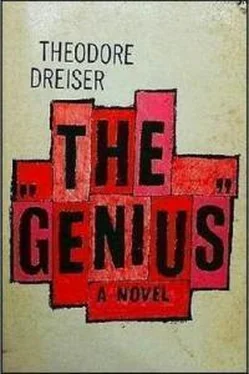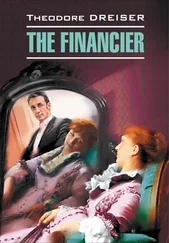Теодор Драйзер - The Genius
Здесь есть возможность читать онлайн «Теодор Драйзер - The Genius» весь текст электронной книги совершенно бесплатно (целиком полную версию без сокращений). В некоторых случаях можно слушать аудио, скачать через торрент в формате fb2 и присутствует краткое содержание. Год выпуска: 2014, Издательство: epubBooks Classics, Жанр: Классическая проза, на английском языке. Описание произведения, (предисловие) а так же отзывы посетителей доступны на портале библиотеки ЛибКат.
- Название:The Genius
- Автор:
- Издательство:epubBooks Classics
- Жанр:
- Год:2014
- ISBN:нет данных
- Рейтинг книги:4 / 5. Голосов: 1
-
Избранное:Добавить в избранное
- Отзывы:
-
Ваша оценка:
- 80
- 1
- 2
- 3
- 4
- 5
The Genius: краткое содержание, описание и аннотация
Предлагаем к чтению аннотацию, описание, краткое содержание или предисловие (зависит от того, что написал сам автор книги «The Genius»). Если вы не нашли необходимую информацию о книге — напишите в комментариях, мы постараемся отыскать её.
The Genius — читать онлайн бесплатно полную книгу (весь текст) целиком
Ниже представлен текст книги, разбитый по страницам. Система сохранения места последней прочитанной страницы, позволяет с удобством читать онлайн бесплатно книгу «The Genius», без необходимости каждый раз заново искать на чём Вы остановились. Поставьте закладку, и сможете в любой момент перейти на страницу, на которой закончили чтение.
Интервал:
Закладка:
In the meantime his lost dream in the shape of Suzanne was traveling abroad with her mother—in England, Scotland, France, Egypt, Italy, Greece. Aroused by the astonishing storm which her sudden and uncertain fascination had brought on, she was now so shaken and troubled by the disasters which had seemed to flow to Eugene in her wake, that she really did not know what to do or think. She was still too young, too nebulous. She was strong enough in body and mind, but very uncertain philosophically and morally—a dreamer and opportunist. Her mother, fearful of some headstrong, destructive outburst in which her shrewdest calculations would prove of no avail, was most anxious to be civil, loving, courteous, politic anything to avoid a disturbing re–encounter with the facts of the past, or a sudden departure on the part of Suzanne, which she hourly feared. What was she to do? Anything Suzanne wanted—her least whim, her moods in dress, pleasure, travel, friendship, were most assiduously catered to. Would she like to go here? would she like to see that? would this amuse her? would that be pleasant? And Suzanne, seeing always what her mother's motives were, and troubled by the pain and disgrace she had brought on Eugene, was uncertain now as to whether her conduct had been right or not. She puzzled over it continually.
More terrifying, however, was the thought which came to her occasionally as to whether she had really loved Eugene at all or not. Was this not a passing fancy? Had there not been some chemistry of the blood, causing her to make a fool of herself, without having any real basis in intellectual rapprochement. Was Eugene truly the one man with whom she could have been happy? Was he not too adoring, too headstrong, too foolish and mistaken in his calculations? Was he the able person she had really fancied him to be? Would she not have come to dislike him—to hate him even—in a short space of time? Could they have been truly, permanently happy? Would she not be more interested in one who was sharp, defiant, indifferent—one whom she could be compelled to adore and fight for rather than one who was constantly adoring her and needing her sympathy? A strong, solid, courageous man—was not such a one her ideal, after all? And could Eugene be said to be that? These and other questions tormented her constantly.
It is strange, but life is constantly presenting these pathetic paradoxes—these astounding blunders which temperament and blood moods bring about and reason and circumstance and convention condemn. The dreams of man are one thing—his capacity to realize them another. At either pole are the accidents of supreme failure and supreme success—the supreme failure of an Abélard for instance, the supreme success of a Napoleon, enthroned at Paris. But, oh, the endless failures for one success.
But in this instance it cannot be said that Suzanne had definitely concluded that she did not love him. Far from it. Although the cleverest devices were resorted to by Mrs. Dale to bring her into contact with younger and to her—now—more interesting personalities, Suzanne—very much of an introspective dreamer and quiet spectator herself, was not to be swiftly deluded by love again—if she had been deluded. She had half decided to study men from now on, and use them, if need be, waiting for the time when some act, of Eugene's, perhaps, or some other personality, might decide for her. The strange, destructive spell of her beauty began to interest her, for now she knew that she really was beautiful. She looked in her mirror very frequently now—at the artistry of a curl, the curve of her chin, her cheek, her arm. If ever she went back to Eugene how well she would repay him for his agony. But would she? Could she? Would he have not recovered his sanity and be able to snap his fingers in her face and smile superciliously? For, after all, no doubt he was a wonderful man and would shine as something somewhere soon again. And when he did—what would he think of her—her silence, her desertion, her moral cowardice?
"After all, I am not of much account," she said to herself. "But what he thought of me!—that wild fever—that was wonderful! Really he was wonderful!"
Chapter XXIX
The dénouement of all this, as much as ever could be, was still two years off. By that time Suzanne was considerably more sobered, somewhat more intellectually cultivated, a little cooler—not colder exactly—and somewhat more critical. Men, when it came to her type of beauty, were a little too suggestive of their amorousness. After Eugene their proffers of passion, adoration, undying love, were not so significant.
But one day in New York on Fifth Avenue, there was a re–encounter. She was shopping with her mother, but their ways, for a moment, were divided. By now Eugene was once more in complete possession of his faculties. The old ache had subsided to a dim but colorful mirage of beauty that was always in his eye. Often he had thought what he would do if he saw Suzanne again—what say, if anything. Would he smile, bow—and if there were an answering light in her eye, begin his old courtship all over, or would he find her changed, cold, indifferent? Would he be indifferent, sneering? It would be hard on him, perhaps, afterwards, but it would pay her out and serve her right. If she really cared, she ought to be made to suffer for being a waxy fool and tool in the hands of her mother. He did not know that she had heard of his wife's death—the birth of his child—and that she had composed and destroyed five different letters, being afraid of reprisal, indifference, scorn.
She had heard of his rise to fame as an artist once more, for the exhibition had finally come about, and with it great praise, generous acknowledgments of his ability—artists admired him most of all. They thought him strange, eccentric, but great. M. Charles had suggested to a great bank director that his new bank in the financial district be decorated by Eugene alone, which was eventually done—nine great panels in which he expressed deeply some of his feeling for life. At Washington, in two of the great public buildings and in three state capitols were tall, glowing panels also of his energetic dreaming,—a brooding suggestion of beauty that never was on land or sea. Here and there in them you might have been struck by a face—an arm, a cheek, an eye. If you had ever known Suzanne as she was you would have known the basis—the fugitive spirit at the bottom of all these things.
But in spite of that he now hated her—or told himself that he did. Under the heel of his intellectuality was the face, the beauty that he adored. He despised and yet loved it. Life had played him a vile trick—love—thus to frenzy his reason and then to turn him out as mad. Now, never again, should love affect him, and yet the beauty of woman was still his great lure—only he was the master.
And then one day Suzanne appeared.
He scarcely recognized her, so sudden it was and so quickly ended. She was crossing Fifth Avenue at Forty–second Street. He was coming out of a jeweler's, with a birthday ring for little Angela. Then the eyes of this girl, a pale look—a flash of something wonderful that he remembered and then―
He stared curiously—not quite sure.
"He does not even recognize me," thought Suzanne, "or he hates me now. Oh!—all in five years!"
"It is she, I believe," he said to himself, "though I am not quite sure. Well, if it is she can go to the devil!" His mouth hardened. "I will cut her as she deserves to be cut," he thought. "She shall never know that I care."
And so they passed,—never to meet in this world—each always wishing, each defying, each folding a wraith of beauty to the heart.
L'envoi
There appears to be in metaphysics a basis, or no basis, according as the temperament and the experience of each shall incline him, for ethical or spiritual ease or peace. Life sinks into the unknowable at every turn and only the temporary or historical scene remains as a guide,—and that passes also. It may seem rather beside the mark that Eugene in his moral and physical depression should have inclined to various religious abstrusities for a time, but life does such things in a storm. They constituted a refuge from himself, from his doubts and despairs as religious thought always does.
Читать дальшеИнтервал:
Закладка:
Похожие книги на «The Genius»
Представляем Вашему вниманию похожие книги на «The Genius» списком для выбора. Мы отобрали схожую по названию и смыслу литературу в надежде предоставить читателям больше вариантов отыскать новые, интересные, ещё непрочитанные произведения.
Обсуждение, отзывы о книге «The Genius» и просто собственные мнения читателей. Оставьте ваши комментарии, напишите, что Вы думаете о произведении, его смысле или главных героях. Укажите что конкретно понравилось, а что нет, и почему Вы так считаете.









